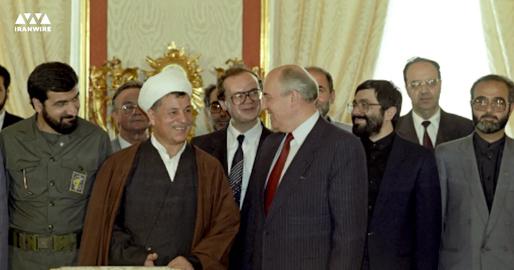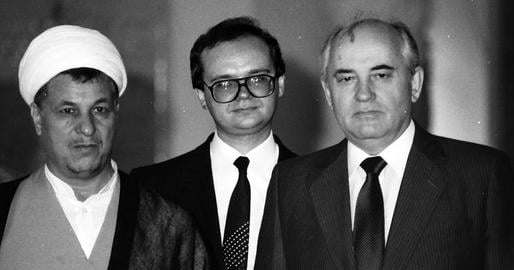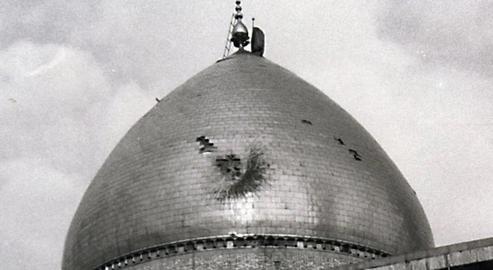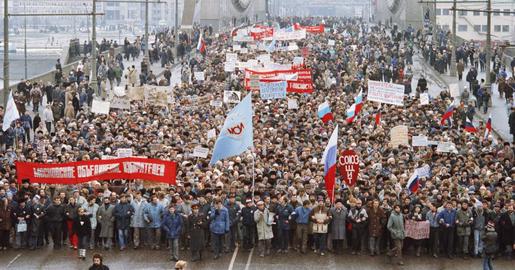Mikhail Gorbachev, the last leader of the Soviet Union, died on August 30 at the age of 92. In a previous article, we wrote about a quiet but seismic arms deal he made with the Islamic Republic in 1989: the biggest of its kind since the 1979 Islamic Revolution, and potentially even up until today.
The summit in Moscow and the deal itself came thanks to the diplomatic exertions of then-Speaker of Parliament Akbar Hashemi Rafsanjani in the run-up to and after the death of Ayatollah Khomeini. This article reviews relations between Rafsanjani and Gorbachev in the aftermath and up until the fall of the Soviet Union, based largely on the former’s diary entries from the period. In the picture Rafsanjani paints of those years, Ayatollah Khamenei, the new Supreme Leader of the Islamic Republic, is conspicuous by his absence.
***
During and after the signing of the sizeable armaments deal between Iran and the Soviet Union, relations between newly-anointed president Akbar Hashemi Rafsanjani and Mikhail Gorbachev reached an unprecedented level. A cluster of anecdotes recorded by officials as they happened speak to a level of confidence between the two rarely if ever seen in diplomatic relations.
Naser Nobari, the last Iranian ambassador to the Soviet Union, has provided additional detail on what went on behind closed doors during Rafsanjani and the Iranian delegation’s 1989 visit to the Kremlin.
Gorbachev, Nobari writes, “brought what became known as a ‘blank check’. He said, ‘The top of this paper is blank but at the bottom the 12 members of the Soviet Politburo have signed it... You write whatever armaments that you want and we shall provide it.’
“In return, he asked Iran to help the Soviet Union to pull out its forces from Afghanistan. As of today, this has been our country’s most important and biggest armaments deal since the revolution.”
However, according to Nobari, Iranian officials had forgotten to give the Russians the list of all the items they wanted. This led to an awkward about-turn following the signing: “After the visit to the Soviet Union the Iranian delegation noticed that they had not asked for one of the most important strategic items for Iran, i.e., an S-200 surface-to-air missile system.”
The Islamic Republic wanted a protective shield against American forces that had been deployed to the Persian Gulf after the so-called Tanker War between Iran and Iraq, a protracted series of armed skirmishes between the two countries against merchant vessels in the Persian Gulf.
A few weeks after Rafsanjani’s visit to Moscow, Hashemi Rafsanjani had succeeded Ayatollah Khamenei as president. The office of the former premier had been dissolved. It was after these major domestic changes in Iran, in summer 1991, that Rafsanjani asked Gorbachev for the S-200 air defense system.
The Iranian ambassador was first asked to deliver a confidential letter to Gorbachev in the Kremlin. But Soviet officials including Gorbachev were then spending their summer vacation in Sochi, a Black Sea beach resort. Hashemi told Nobari to go to Sochi on a private plane, and to hand the letter to Gorbachev in person. When Nobari arrived, Gorbachev was swimming in the sea.
“It was very hot and humid,” Nobari writes. “The gentlemen were in their swimming trunks on the beach and I was wearing a suit. Mr. Shevardnadze [Eduard Shevardnadze, the Soviet Union’s last Foreign Minister] came up to me and said ‘I’ve been assigned the task of delivering your message to Mr. Gorbachev, who is on the beach.’
“I told him, ‘I’ll give you the message, provided you read him the message right now, while he is bathing in the sea, get the answer, and bring it to me.’ I was waiting less than an hour before Shevardnadze returned and said, ‘I have good news. Mr. Gorbachev said give his greetings to Mr. Hashemi [Rafsanjani] and tell him that right now, from here, he’s going to order them to deliver the S-200 system to you.”
Years later, Vladimir Putin sold the Islamic Republic a newer model of this same surface-to-air missile system, the S-300, but refused to deliver it to Iran before the JCPOA was signed. This withholding created tensions in Tehran-Moscow relations, made worse by the fact that Russia did deliver the system to Iran in 2016, the country had already sold a newer model, S-400, to some of Iran’s neighbors.
By contrast, relations between Gorbachev and Rafsanjani became such that the Soviet leader sent Rafsanjani multiple warnings about possible attempts on his life. In his diaries, Rafsanjani writes that on July 16, 1989, while he was giving a banquet in honor of the speaker of the North Korean parliament, Foreign Minister Ali Akbar Velayati “told me the Soviet ambassador has brought a message from Gorbachev, saying a group of Afghans were planning to assassinate me to disrupt cooperation between Iran and the Soviet Union.”
The Beginning of the Fall
Gorbachev continued his contacts with the Islamic Republic until shortly before the dissolution of the Soviet Union in 1991. For instance, Rafsanjani writes in his diary that one day, “Mr. Gorbachev called from Moscow. We had an extensive negotiation. It lasted 27 minutes.”
Many officials of the Islamic Republic could not hide their delight when the first signs of the downfall of the Soviet Union began to surface, exactly as Khomeini had predicted a few years earlier. Even Foreign Minister Velayati, however, failed to predict how it would come to pass.
“I was at the afternoon cabinet meeting,” Rafsanjani wrote on August 21, 1991, “when we received the news that the Soviet coup leaders had been defeated, some of them escaped, and Gorbachev is ready to return to Moscow.
“Interestingly, just a few minutes before this news came, the foreign minister [Velayati]... had said the coup was going to be successful. Also Mr. Khoeiniha [Seyed Mohammad Mousavi Khoeiniha] of the Center for Strategic Research has sent an analysis that says the coup is going to prevail and he wants us to take a position on their side.”
The next day the Soviet ambassador brought Rafsanjani a message from Gorbachev. “It is interesting,” Rafsanjani writes, “that yesterday I also had a message from Gennady Yanayev, the coup leader. Both of them talk about good neighborly relations and the continuation of friendly cooperation.”
Three days later on August 25, Rafsanjani wrote: “News of Gorbachev’s resignation from the Soviet Communist Party, and the dissolution of the central committee... is of international significance. It is the start of the recognition of the Baltic states [as independent countries] and the beginning of the dissolution of the Russian Empire.”
These game-changing events came just a week before the inaugural meeting of Iran’s newly-formed Supreme National Security Council. The first meeting was accordingly dedicated to assesssing the situation in the Soviet Union.
“We examined the most important topics,” Rafsanjani writes. “A plan was drawn up to expand relations with the Muslim republics [in Central Asia]. We prepared a report expressing our position. It was decided that we would send delegations to meet with Gorbachev in Moscow and then to the republics to study their needs and capabilities, and to find ways to expand cooperation with them.”
From 'Most Important Country in the Region' to Client State
On September 18, 1991, Gorbachev sent Yevgeny Primakov, who would later become Boris Yeltsin’s prime minister, to Tehran. “Mr. Primakov, Gorbachev’s special emissary, brought a letter thanking Iran for the positions it has taken and requesting our help to solve their problems,” Rafsanjani wrote. “He claimed the union of the republics would be preserved because they need each other, and they need the Russian Republic more.”
Shortly afterward, during a visit by the Chinese President Yang Shangkun to Iran, a considerable portion of the talks was again devoted to the situation in the Soviet Union. “We went to the airport to welcome the president of the People’s Republic of China, who is visiting Iran on my invitation,” Rafsanjani reported.
“Before and during the dinner we talked a lot, mostly about the state of affairs in the Soviet Union. He believes the Soviet Union’s problems cannot be resolved and Gorbachev’s errors are significant and irreversible.”
Yang Shangkun told Rafsanjani, in the latter’s words, that “discipline in the Soviet Union has fallen apart and cannot be restored. He believes that Gorbachev has no popular base. He criticized Yeltsin for liberalizing the economy, with the encouragement of the West, in an extreme way and without preparation, and now he is at an impasse with no correct alternative.”
In November 1991, as leader of the Soviet Union, Gorbachev had invited Rafsanjani for a state visit. The invitation was hand-delivered in Tehran by the then-Soviet deputy foreign minister. Rafsanjani’s diary entries make it clear that at this point in time, the Islamic Republic still had no correct evaluation of what was happening in the Soviet Union.
Less than two months before the final collapse, Foreign Minister Ali Akbar Velayati paid a visit to the Soviet Muslim republics. “Dr. Velayati came to me and reported about his trip,” wrote Rafsanjani. “He said Gorbachev had become weak and powerless, and Yeltsin was inexperienced and arrogant. The Muslim republics are badly in need of expanded relations with Iran, and they are asking for it.”
On December 15, 1991, Rafsanjani wrote in his diary: “Gorbachev’s abdication means the complete disintegration of the Soviet Union.” This officially took place on December 26 of that year.
From that moment on, Rafsanjani’s diaries make no mention of Gorbachev. The week before on December 19, Tehran had contacted then-President Boris Yeltsin instead, inviting him to come to Tehran. “Alexander Rutskoy, Yeltsin’s vice president, came,” wrote Rafsanjani. “He is a military man and is inexperienced in political and diplomatic affairs.
“He brought Yeltsin’s letter. He writes that he is ready to visit Iran and he wants to realize past agreements, most of which are Russia’s responsibility. He asked for help in securing the release of [Soviet] prisoners of war in Afghanistan. He criticized Gorbachev’s policies... He wrote that he considers Iran the most important country in the region and wants to have special relations with Iran.”
In all the communications between Gorbachev and the Islamic Republic, there is no mention of any contact between him or other Soviet leaders with Ali Khamenei, neither when Ruhollah Khomeini was alive and Khamenei was president, nor after when he succeeded Khomeini as Supreme Leader in 1989.
No matter what, as this past IranWire article explains, Khamenei took all the wrong lessons from the downfall of the Soviet Union. Since then he has kowtowed to Moscow to an excessive degree: so much so that in after Putin’s invasion of Ukraine in February this year, which the Iranian state was marshalled to support in its entirety, the late Rafsanjani’s own daughter Faezeh Hashemi declared: “The Islamic Republic supports Russia without having any interest. We have auctioned off our national interests to the East so that we can oppose the West for no clear reason. We pay ransoms to the East so that we might not be alone in the world.”
visit the accountability section
In this section of Iran Wire, you can contact the officials and launch your campaign for various problems



























comments